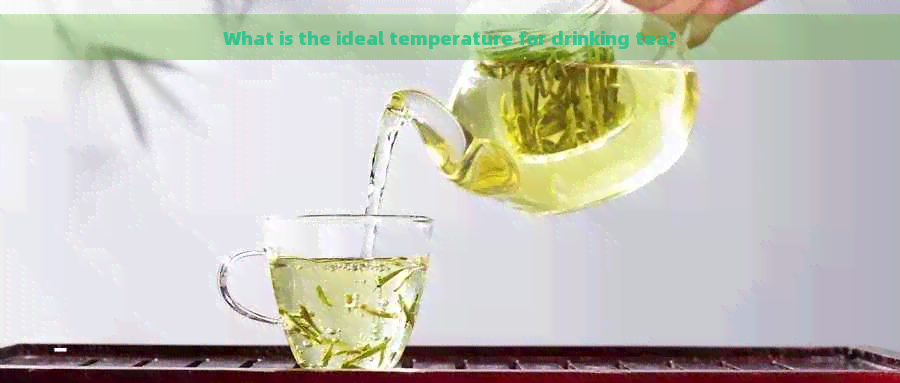Title: What is the Ideal Temperature for Drinking Tea?

Introduction
Tea, an aromatic and versatile beverage, has been cherished by cultures around the world for centuries. From the serene tea ceremonies of Japan to the bustling teahouses of Turkey, tea has become an integral part of many people's dly lives. However, one aspect of tea consumption that often sparks debate is the ideal temperature for drinking it. In this article, we will explore the factors that influence the perfect tea-drinking temperature and delve into the reasons behind it, using the provided list of references as our primary source of information.
The Science of Tea
To understand the ideal temperature for drinking tea, it is essential to first examine the science behind tea leaves and their interaction with water. Tea leaves contn various chemical components, including polyphenols, amino acids, and caffeine. When these components come into contact with hot water, they undergo chemical reactions that release flavors, aromas, and health benefits.
1. Water Temperature and Tea Quality
The temperature of the water used to brew tea significantly impacts its flavor and quality. Different types of tea require varying water temperatures to achieve optimal results. Here's a brief overview of the ideal temperatures for popular tea varieties:
- Green tea: 160-170°F (70-76°C)
- White tea: 175°F (80°C)
- Oolong tea: 190-200°F (88-93°C)
- Black tea: 200-212°F (93-100°C)
2. Impact of Temperature on Flavor
The temperature of the water used to brew tea affects the extraction of flavors from the leaves. Higher temperatures can cause the tea to become bitter, while lower temperatures may result in a weak, underdeveloped flavor. The ideal temperature allows the flavors to be extracted gently, producing a balanced and harmonious cup of tea.
The Ideal Temperature for Drinking Tea
Now that we have a basic understanding of the science behind tea brewing, let's explore the ideal temperature for drinking tea. The perfect temperature can vary depending on individual preferences, tea type, and cultural traditions.
1. General Guidelines
As a general rule of thumb, most teas should be consumed at temperatures between 140-160°F (60-70°C). This range allows the flavors to be fully reciated without causing any discomfort to the drinker. However, it's important to note that this temperature range is not suitable for all teas, as some require slightly higher or lower temperatures.
2. Black Tea
Black tea is traditionally brewed with boiling water, around 200-212°F (93-100°C). However, when it comes to drinking, many people prefer to let it cool down to around 150°F (65°C). This temperature allows the rich flavors and bold character of black tea to shine through without being overpowering.
3. Green Tea
Green tea is best enjoyed at a slightly lower temperature, around 160-170°F (70-76°C). This temperature range helps to prevent the tea from becoming bitter and allows the subtle flavors and aromas to be fully reciated. When drinking green tea, it's recommended to let it cool down to around 140°F (60°C) for optimal enjoyment.
4. White and Oolong Tea
White tea should be consumed at a slightly higher temperature than green tea, around 175°F (80°C). This temperature allows the delicate flavors and aromas of white tea to be fully expressed. Oolong tea, with its complex flavor profile, is best enjoyed at around 190-200°F (88-93°C). However, when drinking, it's advisable to let it cool down to around 150°F (65°C) to avoid any bitterness.
Cultural Traditions and Preferences
The ideal temperature for drinking tea is not only influenced by science but also by cultural traditions and individual preferences. In some cultures, tea is consumed at much higher temperatures, while in others, it's preferred at cooler temperatures.
1. Japanese Tea Ceremony
In Japan, tea is traditionally consumed at temperatures ranging from 160-180°F (70-82°C). This temperature range is believed to enhance the flavors and aromas of the tea, creating a harmonious experience during the tea ceremony.
2. Indian Ch
In India, ch is often consumed hot, at temperatures close to boiling. The spices and milk used in ch blend well with the high temperatures, creating a rich and comforting beverage.
Conclusion
The ideal temperature for drinking tea is a matter of personal preference, tea type, and cultural tradition. While there are general guidelines for the optimal temperature range for each tea variety, it's essential to experiment and find the perfect temperature that suits your taste. By understanding the science behind tea and the impact of temperature on flavor, you can enhance your tea-drinking experience and fully reciate the complexities of this beloved beverage.
-
凤凰在笯丨多少度的茶喝
-
石傲丝丨泡茶的水:多少度的水最适合喝茶?
- 普洱茶分享丨曼松王子山木茶价格:普洱茶与古树茶的市场行情分析
- 普洱茶分享丨曼松贡茶原料基地位置及交通指南:如何抵达曼松贡茶的茶园?
- 普洱生茶熟茶丨曼松贡茶的独特产地与制作工艺探析
- 普洱生茶熟茶丨曼松贡茶什么价位的好喝?
- 普洱茶分享丨曼松贡茶稀缺性与价格解析:一泡难求的原因及市场行情全解
- 普洱生茶熟茶丨曼松贡茶2021年批发价格及云南普洱茶生茶古树茶叶图片京东购买指南
- 普洱茶分享丨'京东曼松贡茶价格查询官网真的吗?'
- 普洱茶分享丨京东曼松贡茶价格及购买方式全面解析:如何选购、口感、保质期等一应俱全
- 普洱茶分享丨曼松古茶300克:口感醇厚,回味悠长的优质普洱茶选择
- 普洱生茶熟茶丨红茶饮用与痤疮患者:医生的建议和健的生活方式
- 普洱生茶熟茶丨全方位茶包推荐指南:品质、口感、泡法一网打尽,满足你的品茗需求
- 普洱茶分享丨愿茶什么比较好喝:综合指南与推荐
- 普洱生茶熟茶丨探索松阳茶文化:品味众多茶叶中的之选
- 普洱生茶熟茶丨如何选择合适的茶与水进行搭配,让泡出的茶更美味?
- 普洱生茶熟茶丨一起茶怎么样:高品质茶叶的享受与推荐
- 普洱茶分享丨枸杞菊花茶的健魅力:与医生一起品味的悠闲时光
- 普洱茶分享丨一起品茗?你需要知道的茶文化知识与茶艺礼仪全解析!
- 普洱生茶熟茶丨一起煮茶:聊天、读书与品饮金桔的美好时光
- 普洱生茶熟茶丨共享茶香时光:一起品茗的美好时刻
- 普洱生茶熟茶丨如何挑选和品尝各种茶几,让您的家居生活更加美好

